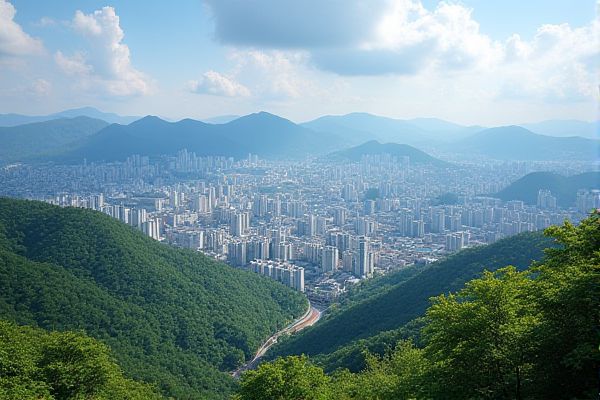
Why moving to South Korea: Vibrant culture and history. Advanced technology infrastructure. Efficient public transportation. Affordable healthcare system. High-quality education institutions. Diverse job opportunities. Low crime rates. Four distinct seasons. Delicious local cuisine. Strong expat community support.
Vibrant culture and history
Moving to South Korea offers an immersive experience in a vibrant culture deeply rooted in its rich and complex history, with traditions such as the elegant Hanbok, flavorful Kimchi, and historical landmarks like the Gyeongbok Palace, all reflecting a deep respect for the past while embracing modern innovations. For more insights into the blend of tradition and modern influence, you can explore this comprehensive overview on The Root of Korean Culture, which delves into how these elements coexist and thrive in today's world.
Advanced technology infrastructure
South Korea's advanced technology infrastructure is highlighted by substantial investments in a government cloud (G-cloud) and an e-government framework, which have enabled efficient and secure digital services, with 90.6% of Koreans using these services and a high satisfaction rate of 93.8%. Additionally, the country boasts the world's best 5G infrastructure, with a significant number of 5G base stations and connections per 100,000 inhabitants, setting a global standard for digital infrastructure. For more insights into the transformative efforts and successes in South Korea, you may explore the Digital Transformation in the Public Sector as an exemplary model for other nations seeking to advance their technological frameworks.
Efficient public transportation
South Korea, particularly Seoul, boasts an efficient public transportation system, characterized by an extensive and reliable network of subways, buses, and taxis. The system is known for its ease of use, cleanliness, and frequency of service, with features like color-coded subway lines, real-time bus information, and integrated public transport fares, making it a convenient and sustainable option for daily commuting. For more detailed insights on the transportation system, visit the Visit Seoul website, which provides comprehensive information for both locals and tourists navigating the city.
Affordable healthcare system
South Korea's healthcare system is highly affordable, with the National Health Insurance (NHI) covering 50-80% of medical costs, leaving residents to pay only about 20% of their medical treatments. This makes it reasonable and accessible for all residents, including expats. For more information on South Korea's healthcare system, you can visit InterNations.
High-quality education institutions
South Korea is renowned for its high-quality education system, with a strong emphasis on student performance in standardized tests and a high tertiary education attainment rate, making it the most educated country in the world according to the OECD. The country's education system is highly competitive, with rigorous standards and extensive private tutoring, contributing to its reputation for producing highly qualified graduates. To learn more about the intricacies of the Education In South Korea, it's essential to understand how these elements shape the nation's academic landscape.
Diverse job opportunities
South Korea offers a vibrant and diverse job market with high-demand opportunities in various sectors, including technology and IT, healthcare, engineering, and English teaching. These fields provide lucrative compensation packages and a range of career options for both local and foreign professionals. For more detailed insights into the most sought-after positions, you can explore the Top 5 High-Demand Jobs in Korea and discover the potential career paths available in this dynamic country.
Low crime rates
South Korea's crime rate fell to its lowest level in a decade in 2021, with 1,774 cases of criminal violations per 100,000 people, marking a 12% decrease from the previous year. This noteworthy decline includes significant reductions in murders, violence, and theft rates. For detailed information, you can visit the full article on South Korea's Crime Statistics from 2021.
Four distinct seasons
South Korea offers a unique experience with four distinct seasons: a delightful spring from April to June, a muggy and wet summer from July to August, a refreshing autumn from September to November, and a freezing cold, snowy but dry winter from December to March. For more detailed insights on the seasonal variations and what to expect during your visit, Selective Asia provides comprehensive information about South Korea's weather patterns and the best times to plan your trip.
Delicious local cuisine
Moving to South Korea offers the opportunity to experience a diverse and flavorful local cuisine, characterized by a wide range of vegetables, seafood, meats, and traditional dishes like kimchi, bibimbap, and bulgogi, all often served in a communal and vibrant dining setting. For those interested in exploring Traditional And Classic Korean Recipes, an excellent resource is the The Spruce Eats website, which provides an array of authentic recipes that capture the essence of Korean culinary tradition. Embracing these tastes is not only a gastronomic delight but also a cultural immersion into the heart of Korea's rich heritage.
Strong expat community support
Moving to South Korea offers strong expat community support through networks like InterNations, which provides opportunities to meet international people at local events, socialize, and make friends, as well as access to valuable tips and advice on expat life in the country.
